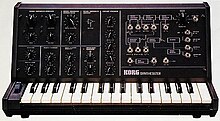Korg MS-10
| MS-10 | |
|---|---|

Korg MS-10
|
|
| Manufacturer | Korg |
| Dates | 1978–1983 |
| Price | US$450 |
| Technical specifications | |
| Polyphony | Monophonic |
| Timbrality | Monotimbral |
| Oscillator | 1 VCO per voice |
| Synthesis type | Analog subtractive |
| Filter | 1 low-pass |
| Aftertouch expression | no |
| Velocity expression | no |
| Storage memory | none |
| Effects | none |
| Input/output | |
| Keyboard | 32 keys |
| External control | CV/Gate |
Korg MS-10 is an analogue synthesizer created by Korg in 1978. Unlike its bigger brother, the MS-20, the MS-10 only has one VCO. It is monophonic and has 32 keys.
The MS-10 is well known for its huge sounding electro bass sounds.
The MS-10 has one VCO with 4 waveforms: triangle, sawtooth, pulse, and white noise.
The MS-10 has the same low pass filter as the MS-20.
There is a simple single transistor VCA. The amplitude of the VCA can be controlled by the envelope generator.
The MS-10 has one LFO, labelled "modulation generator". It has two controls (rate and shape) and two outputs (pulse and sloped).
The shape control affects the pulse width and the shape of the sloped output. At midway, the pulse width is 50% and the output is a triangle wave. Both outputs are available through the patch panel and can be used for triggering the envelope generators - the pulse wave with a key held down, and the sloped without. The depth of LFO modulation of the VCO frequency and the filter cut-off can be controlled from knobs in the respective sections of the control panel.
There is one envelope generator with controls for Hold, Attack, Decay, Sustain and Release.
Although the MS-10 has normalized connections, they can be modified with patch cables. This allows the LFO to modulate the pulse width (which is called pulse width modulation, or PWM) of the VCO or the amplitude of the VCA. It also has a noise generator with white and pink noise outputs, CV in and out, and an external signal input (not to be confused with the "External Signal Processor" of the MS-20).
The MS-10's VCO uses linear voltage control (Hz/Volt) but note that oct/V scaling (-5V to +5V) is available via judicious use of the "freq" CV input socket. A CV converter can also be used.
...
Wikipedia
